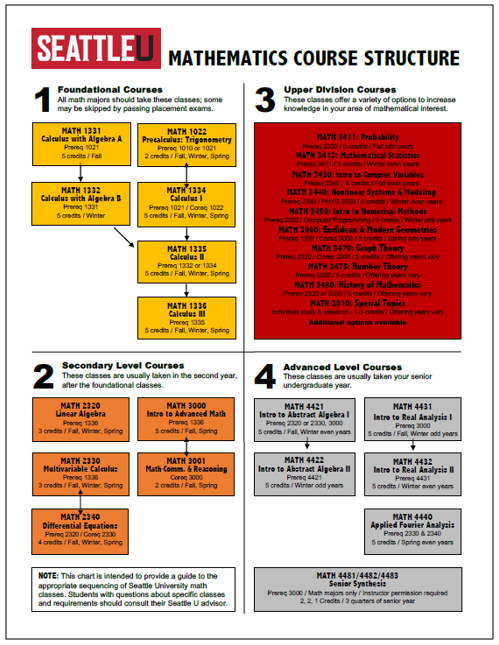
Undergraduate Programs
Undergraduate Math
The Math Department offers 5 major and 2 minor options. Explore our programs below!
Mathematics Majors
-
Bachelor of Arts - Mathematics
-
This degree affords maximum flexibility and is suitable for students planning to teach secondary mathematics or enter a professional school.
-
Bachelor of Science - Mathematics
-
This degree is appropriate for students who plan to obtain a scientific, industrial, actuarial, or government employment.
-
Bachelor of Science - Mathematics, specialization in Applied Mathematics
-
Applied mathematics is the application of mathematical methods by different fields such as physics, engineering, medicine, or business. Thus, applied mathematics is a combination of mathematical science and specialized knowledge.
2023-2024 Program Catalog | Explore the Program
BS in Math - Applied Math (4-Year) | BS in Math - Applied Math (2-Year)
-
Bachelor of Science - Mathematics, specialization in Pure Mathematics
-
Pure mathematics is the study of mathematical concepts independently of any application outside mathematics. These concepts may originate in real-world concerns and the results obtained may later turn out to be useful for practical applications, but pure mathematicians are seeking to investigate and express mathematical truths independent of the physical world.
2023-2024 Program Catalog | Explore the Program
BS in Math - Pure Math (4-Year) | BS in Math - Pure Math (2-Year)
Mathematics Minors
-
Math Minor
-
A math minor is a great way for students to diversify their skillset or add a STEM edge to a liberal arts major. Completing the minor requires 30 credits. Visit our Course Catalog for more information.
A minor requires a minimum of 30 credits of Math, including:
- MATH 1334 - Calculus I OR MATH 1332 - Calculus with Algebra I (B) (5 credits)
- MATH 1335 - Calculus II (5 credits)
- MATH 1336 - Calculus III (5 credits)
- At least 15 credits of MATH courses numbered 2310 or higher
Common elective courses for math minors:
- MATH 2310 - Probability and Statistics for Science and Engineering (5 credits)
- MATH 2320 - Linear Algebra (3 credits)
- MATH 2330 - Multivariable Calculus (3 credits)
- MATH 2340 - Differential Equations (4 credits)
- MATH 3000 - Inrtroduction to Advanced Mathematics (5 credits)
Other upper division math courses can be used to complete the minor, but may have one or more of these courses as prerequisites. The specific selection of courses depends on your interests, and we recommend tou discuss you an advisor or the Math Chair. Up to 15 credits, including courses taken elsewhere and AP or other exam credit, can be transferred to meet these requirements.
-
Data Science Minor
-
Data science is the study of data-driven decision making. Recent decades have seen a ballooning of both the breadth of areas in which data is collected, and the magnitude of that data impacts diverse fields, from biology to sociology, engineering to marketing. Seattle, with its deep connections to the technology industry, has become one of the intellectual centers of this emerging field, and there is a growing demand for data science professionals.
In order to earn a minor in data science, students must complete 30 credits. Download the or visit our Course Catalog for more information.
Programming: Choose one of the following four courses (4-5 credits)
CPSC 1220 - Data-driven Problem Solving and Programming
CPSC 1420 - Programming and Problem Solving I
ECEGR 2000 - Physical Computing with Python
MEGR 2810 - Engineering MethodsStatistics: Choose one of the following nine courses (5 credits)
CRJS 3020 - Criminal Justice Statistics
ECON 2100 - Business Statistics
EVST 3400 - Research Design and Statistics
MATH 1210 - Statistics for Life Sciences
MATH 2310 - Probability & Statistics for the Sciences and Engineering
MATH 3412 - Mathematical Statistics
PSYC 3050 - Statistics and Research Methods II
PUBA 4400 - Research Design and Statistics
SOCW 4010 - Social Work Data AnalysisDatabases: Choose one of the following two courses (5 credits)
CPSC 2300 - Introduction to Databases
CPSC 3300 - Fundamentals of DatabasesData Visualization: Choose one of the following two courses (5 credits)
BUAN 3210 - Data Visualization and Communication
DATA 3310 - Data VisualizationMethodology and Applications of Data Science: Take this Data course (5 credits)
DATA 3320 – Methodology and Applications of Data Science
Data Science Electives: Choose remaining credits from the following courses
BUAN 4310 - Data Mining and Big Data Analytics
CHEM 3000 - Quantitative Analysis
CPSC 4310 - Machine Learning
CPSC 4330 - Big Data Analytics
CPSC 4610 - Artificial Intelligence
ECEGR 4620 - Data Communication Networks
ECEGR 4640 - Internet of Things
ECEGR 4720 - Introduction to Digital Image Processing
ECEGR 4750 - Machine Learning I
ECEGR 4760 - Machine Learning II
ECON 3100 - Quantitative Methods and Applications
ECON 4110 - Applied Econometrics
ECON 4120 - Forecasting Business Conditions
ENSC 2400 - Environmental Sensors
ENSC/EVST 3500 - Intro to Geographic Information Systems
MATH 3411 - Probability
MATH 3450 - Introduction to Numerical Methods
MEGR 4910 - Design Optimization
PHYS 3910 - Computational Physics
PSYC 4030 - Advanced Statistics and Experimental Design
The faculty and staff are excellent. They are concerned about each student's learning and have so much knowledge they are willing to share... The faculty and staff build a wonderful community among math majors. This is fostered through the many events that are put on by the department, as well as the two communal work spaces we have access to. The classes that are currently taught are very well designed and executed.
2018 SU Student